UCT-MARiS Makes Waves at ICSHMO 2025: A Celebration of Southern Hemisphere Science, Innovation, and Collaboration
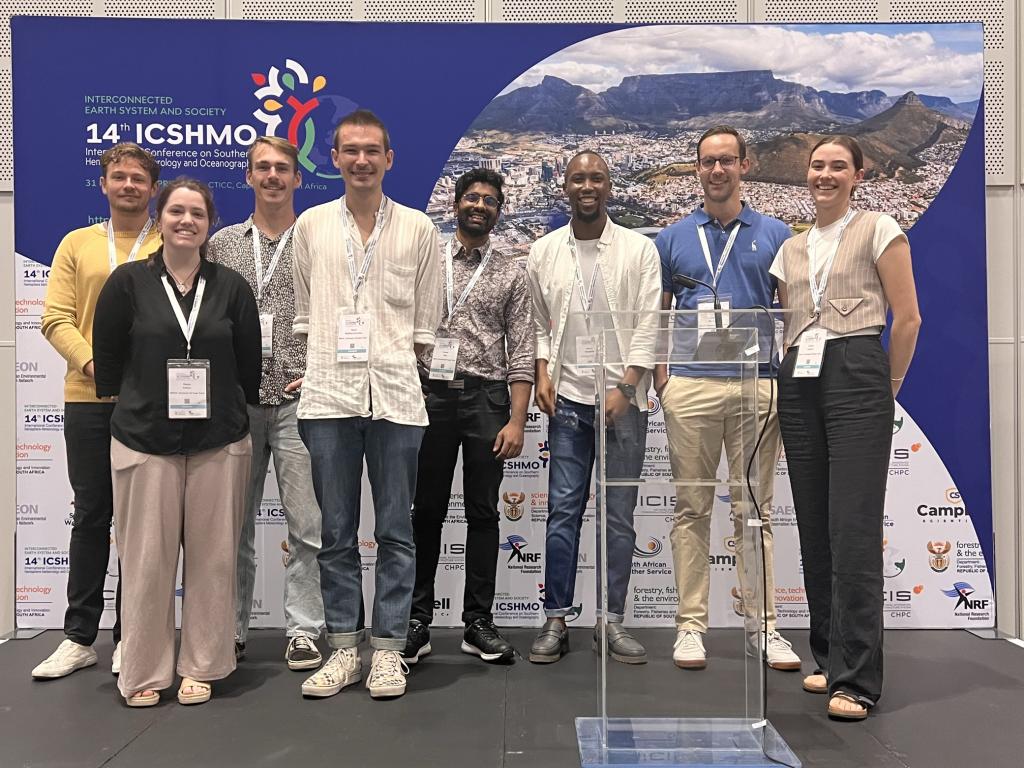
From March 31st to April 4th, 2025, Cape Town became the epicentre of groundbreaking climate and oceanographic research as it hosted the 14th International Conference on Southern Hemisphere Meteorology and Oceanography (ICSHMO) at the CTICC. Amongst the many institutions represented, UCT’s Marine and Antarctic Research for Innovation and Sustainability (MARiS) stood out with an impressive delegation of early career researchers (ECRs) within oceanography and engineering, and academics, sharing their insights, innovations, and passion for Southern Hemisphere science.
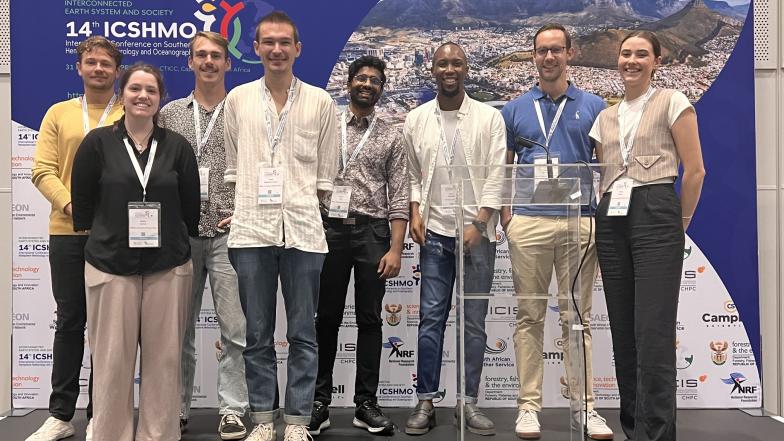
Along with Prof Marcello Vichi and Robyn Verrinder, the ECRs that attended the ICSHMO conference represented the UCT Oceanography and Electrical Engineering research groups including, Wayne de Jager, Dayna Collins, Daniel Jones, David Sephton-Poultney, Anand Nair, Magata Mangatane, Faith February, Rutger Marquart and Tristyn Ferreiro.
Voices from the Ice: MARiS at the Polar Forefront
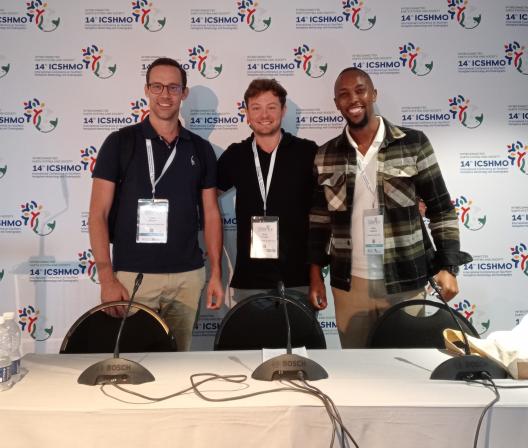
Wayne de Jager, a PhD candidate in Oceanography, delivered a compelling oral presentation titled “Increased Rotational Coupling Between Antarctic Sea Ice and the Atmosphere Over the Last 30 Years” in the Polar session. The presentation sparked engaging discussions with fellow researchers about sea ice, wind, and ocean variability around Antarctica. These conversations not only allowed him to connect with others working in a similar niche, but also provided constructive feedback on his current work and insights into the types of remote sensing data that would benefit the community – key information for his upcoming postdoctoral research. As an ECR, Wayne found the conference to be not only thought-provoking but also a vital platform for Global South scientists to take centre stage in climate discourse and highlight the challenges faced by the Global South, with strong representation from South American, African, and Oceania-based institutions and attendees. Co-chairing a portion of the Polar session alongside Magata Mangatane, marked his first experience in a leadership role at a major scientific conference, thus giving him the opportunity to lead scientific discussions in a formal setting and adding to the rich learning and networking he gained.
“ICSHMO gave me the chance to connect with researchers in my field, receive feedback, and reflect on how our work in the South can shape global understanding of polar systems,” said Wayne. He is grateful to the organizing committee and his fellow researchers for investing in events like ICSHMO, which catalyze discussion, networking, and collaboration within the Southern Hemisphere climate research community, ensuring that our challenges and ideas are represented in a global context.
Daniel Jones, a Masters student in Electrical Engineering, showcased his innovative poster, “Development and Testing of a Multi-Modal Sensor Suite to Observe Ice in the Marginal Ice Zone (MIZ) of Antarctica.” For Daniel, it was thrilling to interact with the end-users of his engineering designs, driving home the importance of accessible communication and collaboration between engineers and scientists.
“My key take away from attending ICSHMO is that there needs to be a closer relationship between engineers and scientific researchers as this forms a symbiotic relationship resulting in better data and thus more insightful findings,” Daniel noted.
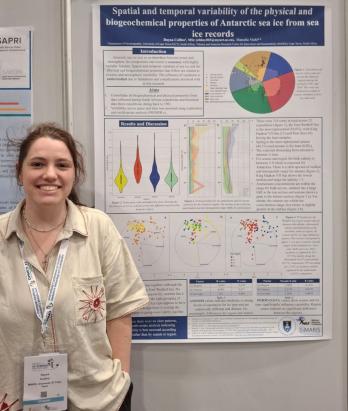
Dayna Collins, an Masters student in Oceanography, shared her work on Antarctic sea ice variability via a poster presentation, titled "Spatial and temporal variability of the physical and biogeochemical properties of Antarctic sea ice from sea ice records". The highlight for her was having the opportunity to engage with others in the field and attend a range of insightful presentations, including attending the Early Career Professionals networking event, which featured a candid panel discussion about the career journeys and experiences of early career and experienced researchers.
“The experience was incredibly motivating,” said Dayna. “It reinforced my passion for this field and showed me the diverse paths within polar research.”
Rutger Marquart, an Oceanography Postdoctoral Fellow, presented during the Polar session on “Coupled dynamics and thermodynamics modelling of heterogeneous sea ice and ocean waves.” His talk added valuable context to current polar modelling challenges and sparked engaging conversations on interdisciplinary approaches. Rutger was pleasantly surprised to see how the conference provided a great platform to engage with fellow scientists and professionals working in related disciplines.
“The keynote talks were a standout. The ICSHMO conference was highly informative and offered a valuable overview of research related to polar science, meteorology and oceanography being conducted in the Southern Hemisphere – seeing where and how my work fits in the broader Southern Hemisphere research landscape was truly inspiring. ”
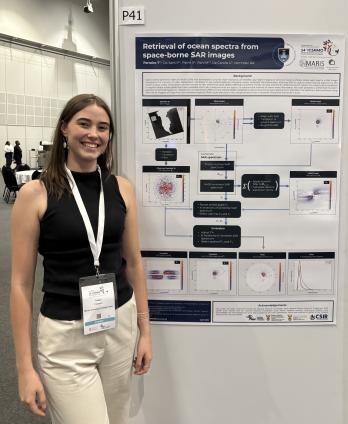
Electrical Engineering Masters student, Tristyn Ferreiro presented her poster, “Retrieval of Ocean Spectra from Space-Borne SAR Images,” and appreciated seeing how her work feeds into the broader scientific understanding of climate science. A key takeaway for her was the need for engagement with local communities when conducting research, this being a message that she hopes to keep in her back pocket as she navigates through her career as an ECR.
“Engaging with the science behind the technology that engineers build really widened my perspective,” said Tristyn, reflecting on the Oceans20 launch and discussions about local ocean tech innovation. “We need to start building locally—and thinking globally.”
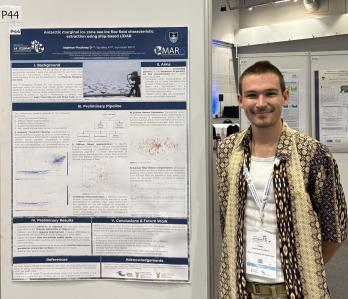
David Sephton-Poultney, also an Electrical Engineering Master’s student, presented a poster on “Antarctic Marginal Ice Zone Sea Ice Floe Field Characteristic Extraction Using Ship-Based LiDAR.” Attending his first-ever conference, let alone an international conference being outside of his area of expertise, David valued the insight into real-world collaboration and seeing how his technical skills can really contribute across various disciplines.
“It was eye-opening to see the value of interdisciplinary work—and how powerful it can be to step outside your niche. It is more effective to not work in a silo and expose yourself to where your work may be applied and where it can be most useful to others.”
Spotlighting MARiS: Sharing Science with Society
Beyond research, UCT-MARiS also had the opportunity to showcase their work at the ICSHMO Societal and Engagement Side Event on Wednesday, 2nd April. Leila Nefdt, Tristyn Ferreiro, Matt Pettit and Robyn Verrinder represented the MARiS team alongside over 100 attendees and several other institutions, sharing exciting projects and building public awareness around the importance of marine and Antarctic research. Matt also excitingly shared one of his demo projects where he has developed an expedition planning tool and discussed ideas over with Dr Tamaryn Morris representing SAPRI/SAEON.
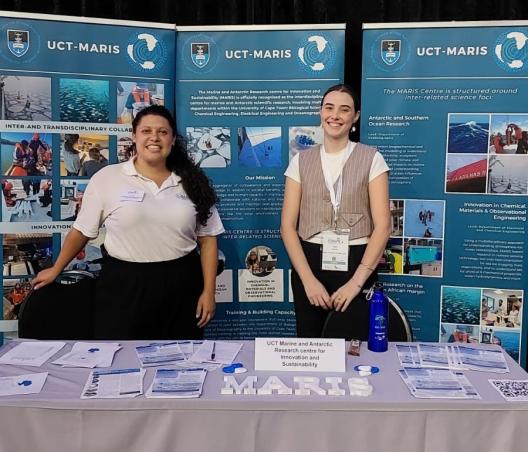

Leading the Conversation on ECR Challenges within the engineering and scientific forefronts of this field, MARiS Deputy Director, Robyn Verrinder, and Postdoctoral Fellow Dr. Faith February lent their voices to a pivotal panel discussion for Early Career Researchers, hosted by Dr. Wade De Kock. They shared practical strategies to navigate the often-competitive academic environment and championed the importance of mentorship, inclusivity, mental well-being, and community.


Congratulations to the ECRs who won and proudly took home some of the best presentation awards at the end of the ICSHMO Conference, namely Wayne de Jager, Dayna Collins, Magata Mangatane and David Sephton-Poultney.